Home Tags Posts tagged with "syrian government"
syrian government
UN inspectors are investigating at least three alleged chemical weapons attacks in Syria that happened after August 21.
Little is known about the latest three alleged attacks, which the Syrian government asked the UN to investigate.
The August 21 attack left hundreds dead; the resulting outcry led Syria to offer up its chemical weapons arsenal.
Inspectors are due in Syria next week – the UN will vote on the visit later.
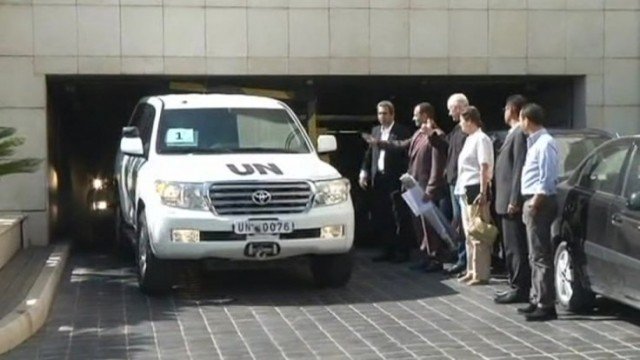
UN inspectors are investigating at least three alleged chemical weapons attacks in Syria that happened after August 21
In Syria itself the violence goes on. Activists said a car bomb killed at least 20 people near a mosque in Rankus, a town north of Damascus, just after Friday prayers.
In a statement, the UN said its current inspection team in Syria is investigating seven allegations of chemical weapons use this year.
The team, led by Ake Sellstrom, arrived in Syria for its second visit on September 25 and hopes to finish its work by Monday 30 September, the statement said.
It is working on a “comprehensive report” into the allegations that it hopes to have finished by late October.
The UN listed the alleged attacks, which all took place this year, as Khan al-Assal on March 19; Sheikh Maqsoud on April 13; Saraqeb on April 29; Ghouta on August 21; Bahhariya on August 22; Jobar on August 24 and Ashrafieh Sahnaya on August 25.
Syria has pushed for the investigation of the three post-21 August incidents.
[youtube XJDZKjKs2mI]
UN chemical weapons inspectors are expected to return to Syria on Wednesday, according to Russian government.
Deputy Foreign Minister Sergei Ryabkov said they would investigate alleged chemical weapons attacks at Khan al-Assal, Sheikh Maqsoud and Saraqeb, according to the Interfax news agency.
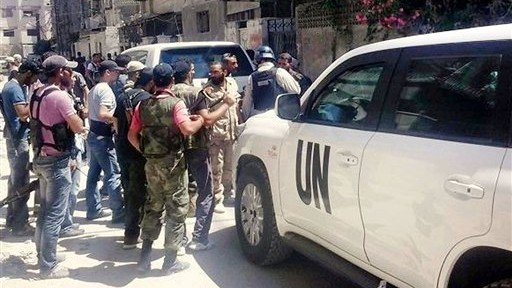
UN chemical weapons inspectors are expected to return to Syria
They had been preparing to do so when chemical weapons were fired at suburbs of Damascus on August 21.
Last week, the UN inspectors confirmed the nerve agent sarin was used in that attack.
They were not asked to ascertain who fired the sarin-filled artillery rockets that hit eastern and western parts of the Ghouta agricultural belt, killing hundreds of people, but Western powers have claimed it could only have been carried out by Syrian government forces.
The Syrian and Russian governments have challenged them to present firm evidence, and instead claimed that rebels were responsible.
[youtube VFlyMi-fWQY]
Vice-President Joe Biden has said the US has “no doubt” that the Syrian government has used chemical weapons and that it must be held accountable.
The US has said its military is ready to launch strikes if President Barack Obama order an attack, and allies say they too are ready to act.
The Syrian government has strongly denied claims it used chemical weapons.
UN weapons inspectors are set to return to the site of last week’s suspected attack near Damascus on Wednesday.
Their evidence-gathering visit was delayed by a day after they were fired on.
The US says it will release its own intelligence report into the incident at Ghouta, a suburb of the capital, in the coming days.
More than 300 people reportedly died there.
President Barack Obama is said to have made at least 88 calls to foreign leaders since Wednesday’s suspected attack.
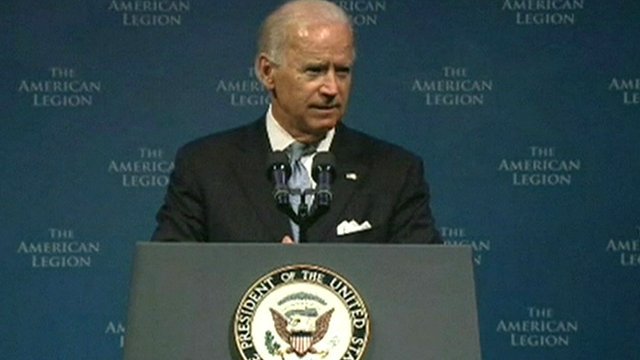
Vice-President Joe Biden has said the US has “no doubt” that the Syrian government has used chemical weapons and that it must be held accountable
British PM David Cameron said the world could “not stand idly by”, and French President Francois Hollande said France was “ready to punish” whoever was behind the attack.
On Wednesday, Russian Foreign Minister Sergei Lavrov warned that “attempts at a military solution will lead only to the further destabilization” in Syria and the region.
Sergei Lavrov emphasised the need for a political solution in a phone call to the joint UN-Arab League envoy to Syria, Lakhdar Brahimi, the foreign ministry in Moscow said.
Russia, China and Iran have previously warned against launching an attack on the war-ravaged country, where more than 100,000 people are thought to have died in two years of fighting.
Stocks have fallen on global markets and oil prices have shot up amid growing concern about an impending attack.
The US has not yet released its intelligence report into the alleged chemical attack, but US officials now say they are certain the Syrian government was behind the incident.
Joe Biden is the most senior member of the Obama administration to blame the Syrian government for the attack.
In a speech to a veterans’ group in Houston, he said there was “no doubt who was responsible for this heinous use of chemical weapons in Syria: the Syrian regime”.
He said that “those who use chemical weapons against defenceless men, women, and children… must be held accountable”.
White House spokesman Jay Carney earlier said it would be “fanciful” to think anyone else could be responsible – saying the Syrian regime remained in control of the country’s chemical arsenal and used the type of rocket that carried the payload used last Wednesday.
But he insisted there were no plans for “regime change”. Any military campaign is likely to be limited in scope, with missile strikes targeting military sites and no ground troops.
[youtube UMtvd0RirLw]
The US forces are “ready” to launch strikes on Syria if President Barack Obama chooses to order an attack, Defense Secretary Chuck Hagel announces.
“We have moved assets in place to be able to fulfill and comply with whatever option the president wishes to take,” said Chuck Hagel.
US Secretary of State John Kerry has said there is “undeniable” proof that Syria had used chemical weapons.
The UK Parliament is to be recalled on Thursday to discuss possible responses.
Britain is considering military responses to the attack.
British PM David Cameron, who has cut short his holiday and returned to London, said MPs would vote on a “clear motion” on the crisis.
Syria’s allies, Russia and China, have stepped up their warnings against military intervention in Syria, with Moscow saying any such action would have “catastrophic consequences” for the region.
Meanwhile Syrian Foreign Minister Walid Muallem said he rejected “utterly and completely” claims that Syrian forces had used chemical weapons.
The Syrian government has blamed rebel fighters for the suspected chemical attack, which took place on August 21 near the Syrian capital Damascus, and reportedly killed more than 300 people.
On Monday, UN chemical weapons inspectors were fired on while investigating one of the five alleged attack sites around Damascus.
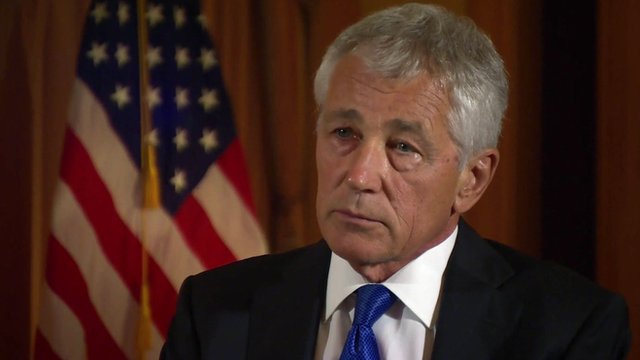
Defense Secretary Chuck Hagel announced that the US forces are “ready” to launch strikes on Syria if President Barack Obama chooses to order an attack
Chuck Hagel said the US Department of Defense had provided President Barack Obama with “all options for all contingencies”.
He said that intelligence currently being gathered by the UN inspectors would confirm that the Syrian government was responsible for the chemical attacks last week.
“I think it’s pretty clear that chemical weapons were used against people in Syria,” he said.
“I think the intelligence will conclude that it wasn’t the rebels who used it, and there’ll probably be pretty good intelligence to show is that the Syria government was responsible. But we’ll wait and determine what the facts and the intelligence bear out.”
Chuck Hagel’s remarks come a day after John Kerry accused the Syrian government of destroying evidence of its chemical weapons use in Damascus by shelling the area.
He said his administration had additional information about the attacks that it would make public in the days ahead. John Kerry described the assaults as a “moral obscenity”.
“What we saw in Syria last week should shock the conscience of the world. It defies any code of morality,” John Kerry said at a news conference on Monday.
“Make no mistake, President Obama believes there must be accountability for those who would use the world’s most heinous weapons against the world’s most vulnerable people.”
The UN Security Council is divided, with Russia and China opposing military intervention and the UK and France warning that the UN could be bypassed if there was “great humanitarian need”.
Russian President Vladimir Putin said there was no evidence that an attack had taken place or who was responsible.
The UN says more than 100,000 people have been killed since the uprising against President Assad began more than two years ago. The conflict has produced more than 1.7 million registered refugees.
Models for possible intervention
- Iraq 1991: US-led global military coalition, anchored in international law; explicit mandate from UN Security Council to evict Iraqi forces from Kuwait
- Balkans 1990s: US arms supplied to anti-Serb resistance in Croatia and Bosnia in defiance of UN-mandated embargo; later US-led air campaign against Serb paramilitaries. In 1999, US jets provided bulk of 38,000 NATO sorties against Serbia to prevent massacres in Kosovo – legally controversial with UN Security Council resolutions linked to “enforcement measures”
- Somalia 1992-93: UN Security Council authorized creation of international force with aim of facilitating humanitarian supplies as Somali state failed. Gradual US military involvement without clear objective culminated in Black Hawk Down disaster in 1993. US troops pulled out
- Libya 2011: France and UK sought UN Security Council authorization for humanitarian operation in Benghazi in 2011. Russia and China abstained but did not veto resolution. Air offensive continued until fall of Gaddafi.
[youtube ANi7ipUKnMA]
The UN is to complain to the Syrian government and rebels after a convoy of chemical weapons inspectors came under sniper fire.
UN Secretary General Ban Ki Moon said he would ask the inspection team in Damascus to register “a strong complaint” so it never happened again.
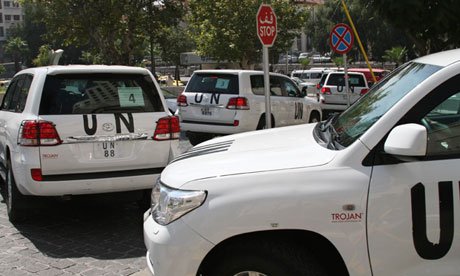
The UN is to complain to the Syrian government and rebels after a convoy of chemical weapons inspectors came under sniper fire
The team is looking at five sites near Damascus where hundreds are reported to have been killed last week.
Russia has warned strongly against Western military action against Syria.
Russian Foreign Minister Sergei Lavrov said any intervention in Syria without a UN mandate would be a “grave violation of international law”.
The West, he told a news conference in Moscow, had not been able to come up with any proof of chemical weapons use while “saying at the same time that the red line has been crossed and there can be no delay”.
He was responding to suggestions from some Western countries that military action against Syria could be taken without a UN mandate over the suspected use of chemical weapons by government forces.
[youtube Iq_rKNrhvBA]
The Syrian government has allowed UN inspectors to investigate allegations of a suspected chemical weapon attack near Damascus.
The team is to begin work on Monday. Activists say Syrian forces killed more than 300 people in several suburbs east and west of the capital on Wednesday.
State media reported that chemical agents were found in tunnels used by rebel fighters, and also that soldiers suffered “suffocation” in fighting around the suburb of Jobar.
State TV is meanwhile reporting that the governor of the central district of Hama, Anas Abdul-Razzaq Naem, has been killed in a car bomb attack.
The Syrian foreign ministry statement broadcast on state television said an agreement to allow UN chemical weapons experts to “investigate allegations of chemical weapons use in Damascus province” had been concluded on Sunday with the UN’s disarmament chief, Angela Kane.
The agreement was “effective immediately”, the statement added.
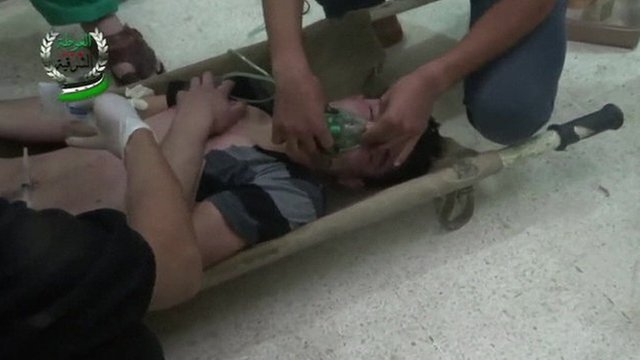
The Syrian government has allowed UN inspectors to investigate allegations of a suspected chemical weapon attack near Damascus
A spokesperson for UN Secretary General Ban Ki-moon subsequently announced that the inspectors were “preparing to conduct on-site fact-finding activities”, starting on Monday. A ceasefire will be observed at the affected locations, the statement said.
Russia, a key ally of Syria, welcomed the decision to allow the inspectors in but warned the West against pre-empting the results.
Medecins Sans Frontieres (MSF) said on Saturday that three hospitals it supports in the Damascus area had treated about 3,600 patients with “neurotoxic symptoms” early on Wednesday morning, of whom 355 died.
While MSF said it could not “scientifically confirm” the use of chemical weapons, staff at the hospitals described a large number of patients arriving in the space of less than three hours with symptoms including convulsions, pinpoint pupils and breathing problems.
UK’s PM David Cameron has discussed the situation in a telephone call with President Francois Hollande of France.
David Cameron agreed a similar response in a telephone conversation with US President Barack Obama on Saturday evening.
Later, Syria’s Information Minister, Omran Zoabi, warned that US military action in Syria would not be a “walk in the park”.
“If the US leads a military intervention, this will have dangerous consequences. It will bring chaos and the region will burn,” he said.
A year ago, President Barack Obama said that any attempt by Syria to use its chemical weapons would be a “red line” for the US, and change his administration’s “calculus” in the region.
[youtube cH2tltFnwQY]
The US has criticized Russia for what it calls an “unfortunate decision” to deliver missiles to the Syrian government.
Chairman of the Joint Chiefs of Staff General Martin Dempsey said the shipment “will embolden the regime and prolong the suffering” that has killed 80,000.
The sophisticated anti-ship missiles could be used to counter any future foreign military intervention, US officials told The New York Times.
Some 1.5 million people have fled the conflict, says the UN refugee agency.
Most have fled to Jordan and Lebanon, but not all have been registered yet, meaning the true total is likely to be far higher, according to the UNHCR.
Meanwhile, Syria’s national production has dropped by 40% and the number of people living below the poverty line has risen from two million to five million in just two years, according to the man in charge of the UN’s plans for reconstructing Syria after the conflict.
Abdullah al-Dardari, a former deputy prime minister in President Bashar al-Assad’s administration, said the rebuilding what has been destroyed would cost up to $80 billion.
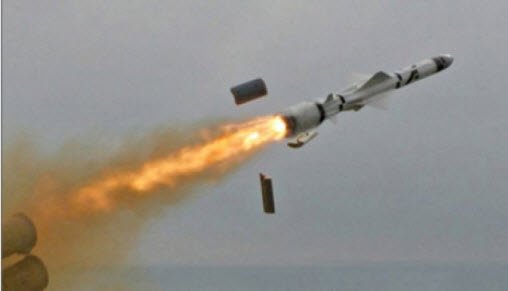
The US has criticized Russia for what it calls an “unfortunate decision” to deliver missiles to the Syrian government
Gen. Martin Dempsey’s description of Moscow’s decision to send missiles to Syria as “ill-timed and very unfortunate” comes amid growing alarm that chemical weapons may have been used in the country, something President Barack Obama has said would be “a red line”.
Russia is one of Syria’s few remaining allies and a long-term arms supplier to the Assad regime. Over the years, in contracts worth billions of dollars, it has sold thousands of tanks, artillery units, aircraft, helicopters and defense systems to Damascus.
In 2007, the two countries signed a deal on the supply of Yakhont missiles which, with a range of 300 km (200 miles), could prove a threat to warships in the Mediterranean.
Although there have been growing calls for arms to be channeled to the rebel fighters in Syria, there has so far been very limited enthusiasm in the West for outright military intervention.
But there is concern that the presence of sophisticated Russian-supplied weaponry will make it much harder to agree and carry out such intervention, implement a blockade or conduct targeted airstrikes in the future.
Without confirming reports of the missile shipment, Russia’s foreign minister Sergei Lavrov said the supply of missiles did not break any international rules.
UN Secretary General Ban Ki-moon met Sergei Lavrov in Sochi on Friday to discuss plans for an international conference to try to find a way of ending the Syrian conflict, which would aim to bring together the Syrian opposition and members of Bashar al-Assad’s government.
The UN estimates that 80,000 people have died in the uprising, and that some 4.25 million people have been displaced within the country.
The simmering conflict has raised tensions on Syria’s borders: On Friday, Turkish state media reported at least 10 people were killed when a fuel tank exploded in the southern town of Altinozu in Hatay province, where car bombs killed 50 people last week.
The fuel tank was set alight by smugglers during a raid by police, officials said.
Frustrated by the lack of international consensus on Syria, Turkish PM Recep Tayyip Erdogan has had talks this week with President Barack Obama in Washington where he was expected to call for a more assertive stance.
Recep Tayyip Erdogan said on Friday the UN should discuss imposing a no-fly zone inside Syria at the international conference being mooted.
“With respect to a no-fly zone… it is not a decision that could be taken between the United States and Turkey. It is something that would have to come through the UN Security Council,” he said.
Syria’s Russian-made military:
- Nearly 5,000 tanks; 2,500 infantry fighting vehicles; 2,500 self-propelled or towed artillery units
- 325 Tactical aircraft; 143 helicopters
- Nearly 2,000 air defense pieces
- 295,000 active personnel; 314,000 reserve personnel
Statistics: IISS
[youtube 6WCDv9e-CT8]
President Bashar al-Assad has said Syrian government needs more time to “win the battle” against rebel forces.
In an interview with pro-government al-Dunya TV, Bashar al-Assad also dismissed as “unrealistic” the idea of creating humanitarian buffer zones within Syria.
Opposition activists say the army has launched offensives across the country to regain control of rebel-held areas.
Heavy shelling was reported on Tuesday in the capital, Damascus, Aleppo, and the north-western province of Idlib.
Bashar al-Assad said the Syrian government was “fighting a battle both regionally and internationally”.
“It definitely needs time to bring it to a decisive end. But I can sum it up in one sentence: we’re heading forward,” he told al-Dunya.
“The situation on the ground is better now, but the conclusion is not there yet. That needs some time.”

President Bashar al-Assad has said Syrian government needs more time to "win the battle" against rebel forces
The security forces were “doing a heroic job in every sense”, he added.
“Everyone is worried about their country – that is normal. But [the rebels] will not be able to spread fear, they never will,” he said.
“I say to Syrians: destiny is in your hands, and not in the hands of others.”
The president mocked senior government and military officials who have defected in recent months, saying their departure amounted to a “self-cleansing of the government firstly, and the country generally”.
Responding to rumors about his whereabouts since a July bombing in Damascus killed four senior officials, he revealed that he was being interviewed from the presidential palace in the capital.
Bashar al-Assad also addressed the proposal by Turkish Foreign Minister Ahmet Davutoglu to set up a United Nations-sanctioned “safe zone” inside Syria to shelter refugees and help distribute humanitarian aid.
“Talk of buffer zones firstly is not on the table and secondly it is an unrealistic idea by hostile countries and the enemies of Syria,” he said.
“Do we go back because of the ignorance of some Turkish officials or do we focus on our relationship with the Turkish people, especially those people who have stood by us during the crisis and were not swayed by the media and material propaganda?”
French Foreign Minister Laurent Fabius admitted on Wednesday that creating a buffer zone would be impossible without imposing a no-fly zone deploying ground forces.
“We are thinking about this. It is very complicated. We cannot do it without the agreement of the Turks and other countries,” he told France Inter radio.
“But what we want is for things to move forward, to make Bashar fall as quickly as possible and at the same time find humanitarian solutions.”
The UN refugee agency warned on Tuesday that as many as 200,000 refugees could flee to Turkey to escape fighting in Syria – almost double the number Turkey has said it can take.
The UNHCR said 5,000 refugees were now arriving at the Turkish border every day, compared to about 500 earlier this month. There are already more than 74,000 in Turkey, and 128,000 in other countries.
There are also thought to be more than 1.2 million internally displaced people in Syria, and 2.5 million in need of humanitarian assistance.
Former Syrian PM Riad Hijab, who defected to Jordan last week, has claimed that President’s Bashar al-Assad regime is collapsing “morally, financially and militarily”.
Speaking in the Jordanian capital, Amman, Riad Hijab said the regime controlled no more than 30% of Syrian territory.
Riad Hijab called on the opposition abroad to unite and on the Syrian army to stand alongside its people.
UN humanitarian chief Valerie Amos has held talks in Damascus in an attempt to increase the flow of emergency aid.
Riad Hijab told a news conference he was joining the rebel side and urged other political and military leaders to break away from President Bashar al-Assad’s regime.
“I urge the army to follow the example of Egypt’s and Tunisia’s armies – take the side of people,” he added.
This is the first time Riad Hijab has spoken publicly since fleeing to Jordan with his family last week.
The US has responded by lifting sanctions it had earlier imposed on him because of his role in the Syrian government.

Former Syrian PM Riad Hijab has claimed that Assad regime is collapsing "morally, financially and militarily"
The highest-ranking political figure to defect from the Assad regime, Riad Hijab explained how he had decided to leave Syria on 5 August before spending three days travelling to Jordan with the help of the Free Syrian Army (FSA).
“Syria is full of officials and military leaders who are awaiting the right moment to join the revolt,” he asserted.
Damascus is also facing the prospect of increased diplomatic isolation, as the Organisation of Islamic Co-operation (OIC) meets in Saudi Arabia to consider a recommendation from foreign ministers to suspend Syria from the 57-member group.
Iran is resisting the proposal. “We have to look for other ways, means and mechanisms for resolving conflicts and crises,” Foreign Minister Ali Akbar Salehi said.
President Bashar al-Assad has sent an aide, Buthaina Shaaban, to Beijing for talks on the crisis with Chinese officials.
A Chinese foreign ministry spokesman said it was also considering an invitation to members of the Syrian opposition.
Beijing has opposed recent UN resolutions on Syria, but backs a ceasefire between the warring parties as well as political dialogue.
Valerie Amos, the UN under-secretary general and emergency relief co-ordinator, held talks in Damascus on Tuesday with the aim of discussing ways of “urgently scaling up relief efforts and reducing the suffering of civilians caught up in the fighting”, the UN said.
She was expected to ask for more foreign aid workers to be given visas, as the Syrian Arab Red Crescent struggles to distribute food to those who need it.
After her meeting with senior Syrian officials, including newly appointed Prime Minister Wael al-Halqi and Syria’s UN ambassador, Faisal Miqdad, Baroness Amos said that the crisis was affecting a growing number of ordinary men and women.
“Three months ago we thought there were about a million who were in need of assistance. We’re now having to revise that number to about 2.5 million.”
More than one million people have been internally displaced by the conflict. More than 140,000 people have fled the violence and crossed into Lebanon, Jordan, Turkey and Iraq.
Baroness Amos will head next for Lebanon to meet families who have fled Syria. She will discuss with the government in Beirut as well as humanitarian agencies how best to support the refugees.
Violence has spread in recent weeks to Syria’s two biggest cities, Damascus and Aleppo. On Tuesday, activists in Aleppo said the army had shelled several rebel-held areas including Saif al-Dawla and Salah al-Din. A rebel commander was reportedly killed by a tank shell.
State news agency Sana reported that a number of “terrorists” had been killed or wounded in several areas of the city.
In Damascus, people were reportedly fleeing the central district of Qabun, fearing a military offensive as security forces raided two other districts.
The rebels have themselves come in for increasing criticism because of their apparent mistreatment of prisoners in and around Aleppo.
A day after videos emerged of one man having his throat cut and the bodies of others being thrown off a roof, the FSA has spoken out against what it terms “executions”.
“You should be aware that carrying out execution operations in a qualitative and haphazard way against the shabiha (pro-government militia) and the regime’s cronies is not permitted religiously or lawfully,” a spokesman said.
Meanwhile, Russia denied its Deputy Foreign Minister, Mikhail Bogdanov, had told a Saudi Arabian newspaper in a telephone interview that President Assad had agreed to step down.
The newspaper also quoted him as saying and Bashar al-Assad’s brother, Maher, had lost both legs in last month’s bombing at the National Security Bureau headquarters in Damascus.
But the foreign ministry told the BBC that Mikhail Bogdanov had not spoken to al-Watan and the quotes it published were “a provocation”.
Syrian human rights and opposition activists say at least 21,000 people have been killed since pro-democracy protests erupted in Syria in March 2011.
Robert Mood, the former head of the UN observer mission in Syria, says it is “only a matter of time” until President Bashar al-Assad’s government falls.
But Norwegian Maj. Gen. Robert Mood, who left Syria last week, said Bashar al-Assad’s fall would not necessarily mean an end to the 16-month-old conflict.
Syrian forces renewed their assault on the northern city of Aleppo, Syria’s most populous city, on Friday.
The US state department says it fears a massacre by Syrian government forces.
The pro-government al-Watan newspaper warned that the “mother of all battles” was about to start.
“In my opinion it is only a matter of time before a regime that is using such heavy military power and disproportional violence against the civilian population is going to fall,” Maj. Gen. Mood told the Reuters news agency.
Separately, UN High Commissioner for Human Rights Navi Pillay appealed to both sides to spare civilians, citing concerns of “the likelihood of an imminent major confrontation”.
Navi Pillay said she had received “as yet unconfirmed reports of atrocities, including extra-judicial killings and shooting of civilians by snipers” in Damascus.
Saying she had also received more reports of opposition fighters torturing or executing prisoners, Navi Pillay stated her belief that “crimes against humanity and war crimes have been, and continue to be, committed in Syria”.

Robert Mood, the former head of the UN observer mission in Syria, says it is only a matter of time until President Bashar al-Assad's government falls
An activist based in Fardos in Aleppo said at least 15 people had died on Friday morning during the military’s bombardment of a building.
“We have medical supplies but no doctors or equipment to treat the injured. The situation feels hopeless,” said the activist, identified only as Ramy.
“The people of Aleppo are not coping with this crisis. They are dying. It is a massacre. People can leave their homes and move around the city but who would really want to take the risk of being shot or bombed?”
He insisted that activists would continue to resist the government forces.
“Activists are prepared to engage in a guerrilla war, from street to street if necessary,” he said.
The Red Crescent has suspended some of its operations in Aleppo because of the heavy fighting.
Rebels have been stockpiling ammunition and medical supplies in preparation for the expected assault.
Syrian troops fired from helicopter gunships on south-western neighborhoods on Friday morning, the Syrian Observatory for Human Rights told the AFP news agency.
A convoy of tanks from Idlib province, near the border with Turkey, arrived in Aleppo overnight and was attacked by rebels, the Observatory said.
The US State Department said the deployment of tanks, helicopter gunships and fixed-winged aircraft around Aleppo suggested an attack was imminent.
But the US would not intervene, said spokeswoman Victoria Nuland, except by continuing to channel non-lethal assistance (such as communications equipment and medical supplies) to the rebels.
A Syrian MP from Aleppo has fled to Turkey, Turkey’s state-run Anatolia news agency says.
Ikhlas Badawi, a mother of six, said she was defecting in protest at the “violence against the people”.
Meanwhile, another defector, Gen. Manaf Tlas, has put himself forward as a possible figure to unite the fractious opposition.
In an interview with a Saudi newspaper, Asharq al-Awsat, he said: “I am discussing with… people outside Syria to reach a consensus with those inside.”
However, some in the opposition regard Gen. Manaf Tlas – who fled earlier this month – as a compromised figure too close to the government of President Bashar al-Assad.
For its part, Turkey has said it will not tolerate the creation of a Kurdish-run region in northern Syria.
This follows reports that Kurdish rebels in northern Iraq had formed an alliance with a Kurdish party across the border in Syria.
Turkey would strike against “terrorists” in northern Syria, warned Prime Minister Recep Tayyip Erdogan, in the same way it has attacked bases in northern Iraq used by militants linked to the Kurdistan People’s Party (PKK).
Turkey is concerned that the creation of a Kurdish authority in the north of Syria could provide a sanctuary to Kurdish rebels fighting for self-rule in Turkey’s southeast.
Fresh fighting in many parts of Syria throughout the night has followed the deaths on Wednesday of three top regime figures in a suspected suicide attack.
Syrian government and opposition both said large numbers of people died, in one of the bloodiest days of the conflict.
Activists said artillery and helicopters were used in the worst attack, on a funeral south of Damascus.
The president’s brother-in-law, defence minister and head of Bashar al-Assad’s crisis team died in yesterday’s bombing.
Rebel groups said the bomb had been planted the day before the meeting at national security headquarters where it was detonated. They predicted the government’s imminent fall.
The army has pledged to rid Syria of “criminal and murder gangs”.
The London-based Syrian Observatory for Human Rights said on Thursday that more than 150 people had died across the country on Wednesday, in one of the worst days of a 16-month revolt.

Syrian government and opposition both said large numbers of people died on July 18, in one of the bloodiest days of the conflict
Video of one attack posted on the internet showed scenes of pandemonium after what activists said was a helicopter gunship attack on a funeral procession at Sitt Zeinab, south of the capital. They said at least 60 people were killed in this incident alone.
In Damascus, state media said, security forces launched operations in many areas which have been clashes in recent days, mainly in the south-west and north-east, killing many “terrorists”.
Activists reported more tanks moving towards the capital from the west.
Following Wednesday’s bombing, the government has vowed to root out ruthlessly what it describes as armed terrorists backed by outside powers.
The rebels are on the offensive too, warning state TV and radio to evacuate their personnel before its headquarters comes under attack.
In contrast with earlier explosions in Damascus, there were no photos or video from the scene of Wednesday’s blast at the security headquarters.
Among the victims were:
• Defence Minister and ex-chief of staff Gen Daoud Rajiha
• Deputy Defence Minister Assef Shawkat, married to Bashar al-Assad’s sister Bushra
• Assistant to the vice-president and head of crisis management office Gen Hassan Turkomani
• Two other senior officials – interior minister Mohammad Ibrahim al-Shaar and National Security Bureau chief Hisham Ikhtiar- were wounded
The US said the killings were a major blow to the regime.
“I think the incident today makes clear that Assad is losing control,” White House spokesman Jay Carney told reporters.
“All of our partners internationally need to come together to support a transition.”
In Lebanon, Hezbollah leader Hassan Nasrallah condemned what he termed a targeted killing: “We are going to miss them and we offer our condolences to the Syrian leadership and the Syrian army.”
Russia said some countries had incited the opposition rather than calming it down.
The attack prompted the UN Security Council to delay until Thursday a vote on a Western-sponsored resolution calling for tougher sanctions on Damascus.
UN Secretary General Ban Ki-moon said the Security Council must “shoulder its responsibility and take collective and effective action.
“Time is of the essence. The Syrian people have suffered for too long. The bloodshed must end now,” Ban Ki-moon said.
The mandate for the UN’s observer mission runs out on Friday. The resolution before the Security Council would extend the mission and place international envoy Kofi Annan’s peace plan under Chapter 7 of the UN Charter, which could ultimately authorize force.
But Russia is firmly against harsher measures. In a telephone conversation between President Barack Obama and President Vladimir Putin on Wednesday, the two leaders were said to be divided in their approaches to ending the bloodshed.
[youtube XJkGIksqt6Y]
[youtube _lZHby38jWU]
President Bashar al-Assad is quoted as saying he regrets “100 per cent” a Turkish jet was shot down after entering Syrian airspace.
In an interview with Turkey’s Cumhuriyet newspaper, Bashar al-Assad argues that the plane was flying in an area previously used by Israel’s air force.
The plane went down in the Mediterranean last month and the two pilots have not been found.
The incident has heightened tensions between the two countries.
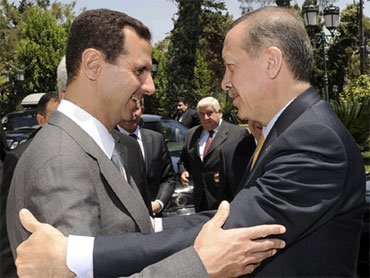
President Bashar al-Assad is quoted as saying he regrets "100 per cent" a Turkish jet was shot down after entering Syrian airspace
Last week, Turkish PM Recep Tayyip Erdogan condemned Syria’s action and described the neighboring country as a “clear and present threat”.
Turkey reinforced border areas with rocket-launchers and anti-aircraft guns.
On Sunday, Turkey said it had scrambled six F-16 fighter jets when Syrian helicopters had approached the border.
“We will not allow (the shooting down) to turn into open combat between the two countries,” President Bashar al-Assad is quoted as saying.
Cumhuriyet, which published the interview on Tuesday, does not indicate when it took place but shows a picture of Bashar al-Assad standing beside its Ankara bureau chief Utku Cakirozer.
In other developments:
• Turkish media reported late on Monday that another 85 Syrian soldiers, including 14 senior officers, had defected across the Turkish border. It is one of the biggest groups of army defections since the March 2011 uprising in Syria began.
• Syria has been accused of practicing a widespread policy of state-sanctioned torture, in a Human Rights Watch report . The group says it has identified at least 27 detention centres across Syria.
• UN human rights chief Navi Pillay has said that both Syrian government forces and the opposition have been involved in operations that harmed civilians. She has appealed for further militarization of the conflict to be avoided at all costs.
Syrian government forces have renewed their attack on the city of Homs, one of the focal points of the uprising against President Bashar al-Assad.
Video published on the internet purportedly from Homs showed intermittent shelling and black smoke.
UN mediator Kofi Annan is concerned civilians have been trapped in Homs and al-Haffa, a town in Latakia province also said to be under attack.
The US says it fears the government may be planning “another massacre”.
Kofi Annan’s spokesman, Ahmad Fawzi, said civilians had been trapped in both Homs and al-Haffa.
Kofi Annan was demanding immediate entry to al-Haffa for UN military observers be allowed, he added.
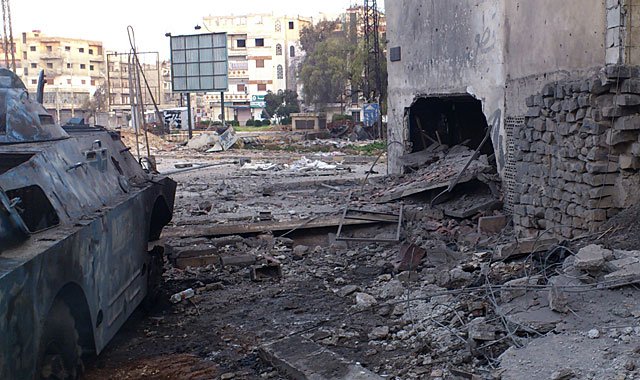
Syrian government forces have renewed their attack on the city of Homs, one of the focal points of the uprising against President Bashar al-Assad
As joint envoy for the UN and the Arab League, Kofi Annan brokered a six-point peace plan, including a ceasefire which came into nominal effect two months ago but has now been virtually abandoned.
Syrian army appeared to be using an unmanned surveillance drone to select buildings as targets for shelling.
A steady stream of mortar rounds landing in the old city of Homs at a rate of about one a minute.
The UN team – which has been trying for two days to gain access to the old city – has still not succeeded.
All the UN can do is stand by and watch.
US state department spokeswoman Victoria Nuland said it was “deeply alarmed” at “reports from inside Syria that the regime may be organizing another massacre”.
Such an attack could happen, it suggested, in al-Haffa or the towns of Deir el-Zour, Homs or Hama, or in the suburbs of the capital, Damascus.
According to the London-based Syrian Observatory for Human Rights, at least 74 people were killed across Syria on Monday.
An activist website, the Violations Documenting Centre, said there had been 29 deaths in the past week from bombardment in al-Haffa. All but three of the dead were civilians, it added.
These reports cannot be confirmed independently because Syria heavily restricts journalists’ freedom of movement.
The Syrian government blames the violence on foreign-backed armed terrorist gangs.
Separately, UN monitors and human rights activists said Syrian government forces had used helicopters to bombard the town of Rastan, in Homs province.
The town has been under intermittent army shelling “for months”, the Observatory said.
UN spokeswoman Sausan Ghosheh said monitors had seen Syrian helicopters firing on Rastan and another rebel stronghold, Talbisa.
In Talbisa, rebels from the Free Syrian Army captured soldiers from government forces, she added.
[youtube RdOsDRIItZA]
At least 47 people have been killed in an attack by pro-government militia in the embattled Syrian city of Homs, according to human rights activists.
Women and children are said to among those who were reportedly tortured and killed on Sunday night in the neighborhood of Karm el-Zeytoun.
The Syrian government acknowledged the deaths, but blamed “armed terrorists”.
The attack happened hours after UN-Arab League peace envoy Kofi Annan ended his two-day mission to Damascus.
Homs has been under assault for weeks as government forces have tried to root out rebel fighters. Parts of the city are devastated.
The main opposition group, the Syrian National Council (SNC), has called for an emergency UN Security Council meeting to discuss the killings, the AFP news agency reports.
Hundreds of families fled the Karm el-Zaytoun area of the city on Monday after reports of the attack in their neighborhood overnight, the British-based Syrian Observatory for Human Rights said.
One activist in Homs, Hadi Abdallah, told the AFP the bodies of 26 children and 21 women were found, some with their throats slit and others bearing stab wounds.
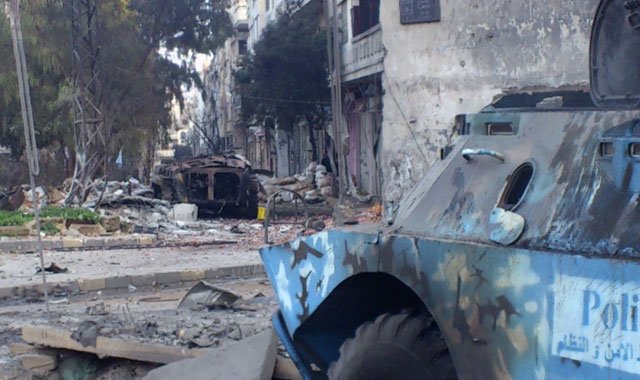
At least 47 people have been killed in an attack by pro-government militia in the embattled Syrian city of Homs
Both the opposition Syrian Revolution General Commission (SRGC) and the Local Coordination Committees (LCC) put the toll at 45.
The SRGC said that some of the victims had been burned alive with heating fuel poured over them and others had their necks and limbs broken.
Mulham al-Jundi, an opposition activist and member of the SNC, said Karm el-Zeytoun was experiencing a military bombardment similar to the one seen in Baba Amr district in recent weeks.
He said government troops were firing rockets from tanks outside the neighborhood, then going in “and killing the families who stay inside these areas”.
Reports are difficult to verify because of tight restrictions on independent media operating in Syria.
Footage posted on YouTube, said to show the bodies of men, women and children killed in the attack, made for grim viewing.
In one video, at least 11 bodies can be seen, including at least four young children covered in blood, he adds.
Syrian state television accused “armed terrorist gangs” of carrying out the killings, saying the bodies had been filmed in an effort to discredit the government.
Both the LCC and the British-based Syrian Observatory for Human Rights blame the pro-government Shabiha militia for the attack.
The Shabiha has been blamed for many of the atrocities carried out since the uprising began nearly a year ago.
Activists say their presence has allowed the government to deny any involvement in the most brutal actions against protesters.
Kofi Annan left Syria on Sunday after two days off talks with President Bashar al-Assad, saying he was “optimistic” that a peace deal could be found.
He said he had presented Bashar al-Assad with “concrete proposals” to bring an end to the bloodshed, but gave no hint that a deal was imminent.
Syria will be on the agenda when US Security Council foreign ministers meet in New York later.
[youtube H47eiZ7vjrs]
More than 200 people were killed by Syrian government forces which bombarded the city of Homs with tank shells and mortars, opposition groups say.
Activists say a massacre has occurred but the government denied attacking, accusing the opposition of propaganda.
But opposition fighters, though outgunned, plan to launch a “general offensive”.
A vote is expected later on a UN draft resolution, despite Syrian ally Russia voicing strong objections.
Foreign Minister Sergei Lavrov said on Saturday the current draft included measures against President Bashar al-Assad’s government, but not against armed opposition groups.
Sergei Lavrov said Moscow had tabled amendments to the text to try and ensure the UN would not appear to be taking sides in a civil war.
Homs appears to have come under a “pretty relentless” bombardment, which targeted areas outside government control.
Funerals have already begun in large numbers, amid reports of a death toll as high as 260.
Russia’s foreign minister said it would be a “scandal” to ask the UN Security Council to vote on the resolution in its current form.
Russia is Syria’s main ally on the council, and has said it will veto any resolution calling on President Bashar al-Assad to stand down.
Moscow has continued to supply weapons to Syria despite the protests.
However, French Foreign Minister Alain Juppe said the Homs assault was a “further step in savagery” and warned against a veto.
“Those who would hinder the adoption of such a resolution would assume a heavy responsibility in history,” he said.
In another blow to the Assad regime, Tunisia’s government said it had begun the process of expelling the Syrian ambassador and withdrawing recognition from the government.
A death toll higher than 200 at Homs would make it by quite a long way the bloodiest day since protests began.
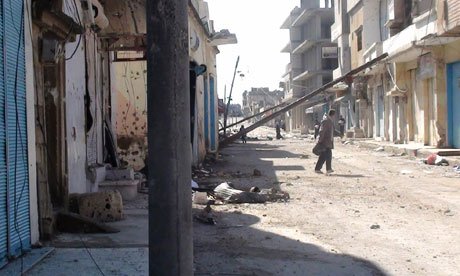
More than 200 people were killed by Syrian government forces which bombarded the city of Homs with tank shells and mortars, opposition groups say
Homs was one of the first cities to join anti-Assad protests, and became one of the focal points of dissent after government forces fired on crowds in April last year. Many army defectors have sought refuge in the city.
Activists said most of the deaths were in the residential area of Khalidiya.
Reports said a hospital had been destroyed in Khalidiya, and residents said more than 30 houses had been wrecked in the barrage.
“We were sitting inside our house when we started hearing the shelling. We felt shells were falling on our heads,” Khalidiya resident Waleed told Reuters news agency.
Video footage emerged on the internet showing several bodies covered in blood with a voiceover saying the bombardment was still going on.
State media dismissed the Homs casualty reports as a “hysterical campaign of incitement” by armed gangs designed to influence the UN.
“The civilians shown by satellite television stations are citizens who were kidnapped and killed by armed gunmen,” said a report on Sana news agency.
International media outlets are restricted in Syria, making it difficult to verify the claims of either side.
Meanwhile, activists have attacked Syrian embassies around the world
• Around 50 mainly Syrian protesters broke into their country’s embassy in Athens early on Saturday, smashing windows and
• About 20 protesters forced their way into the Syrian embassy in Berlin late on Friday and damaged offices, police said. German TV showed a Syrian resistance flag hanging from one of the windows and graffiti sprayed on the outside of the building
• About 150 demonstrators gathered outside the Syrian embassy in London early on Saturday and five people were arrested after entering the building
• In Cairo, protesters stormed the embassy building, smashing furniture and setting fire to parts of the building
Syria has been gripped by nationwide protests against Bashar al-Assad’s regime for almost a year.
The UN stopped estimating the death toll after it passed 5,400 in January, saying it was too difficult to confirm numbers.
The Syrian government says at least 2,000 members of its security forces have been killed fighting “armed gangs and terrorists”.
[youtube R3_RdwCtzY4]
At least 10 people have been killed and 46 have been injured in a suicide attack on a district in central Damascus, Syria, according to the state media.
National state TV showed pictures of the blood-spattered streets of Midan district following the attack, which it blamed on “terrorists”.
Two weeks ago 44 people died in similar blasts the authorities also blamed on terrorists. Opposition activists accused the government of staging them.
Arab League monitors are in Syria on a month-long observer mission.
They are trying to ensure compliance with a peace plan, but activists say a Syrian government crackdown has continued, with scores of people killed.
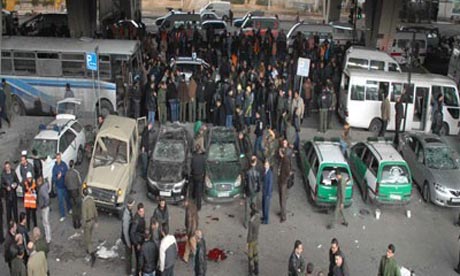
At least 10 people have been killed and 46 have been injured in a suicide attack on a district in central Damascus, Syria
A resident of Midan – the scene of reported anti-government protests in recent weeks – told Reuters news agency that ambulances were in the area.
Most foreign correspondents have been barred from reporting within Syria itself.
“Immediate information indicates that a suicide terrorist blew himself up at a traffic light in the Midan neighbourhood,” Reuters news agency quoted state television as saying.
According to state TV, at least 10 people are confirmed dead with authorities fearing the toll could rise to 25 and state news agency Sana said 46 had been injured.
According to Syrian authorities, most of those killed were civilians, but some security personnel were among the casualties.
TV pictures showed the shattered blood-splattered windows of what appeared to be a bus carrying policemen.
The Syrian government blamed a similar bombing two weeks ago on al-Qaeda, but no proof has been offered. Damascus blames the wider protests and violence in the country on Islamist militants.
Many observers are skeptical of those claims and opposition groups accuse the Syrian leadership of staging the blasts to try to influence Arab League observers, who are in the country to monitor the ongoing violence.
The Arab League mission has been criticized by opposition groups for failing to stem government violence and even for failing to report accurately the situation in Syria.
Burhan Ghalioun – the head of the main opposition group, the Syrian National Council – said he feared the observers could be providing political cover for the regime to suppress street protests.
Opposition activists have urged Syrians to take to the streets in mass protests ahead of an Arab League meeting in Cairo on Sunday, which will debate the initial findings of the observer mission.
[youtube XYoyXKr9WMo]
















